How Many Men Attain Wizard Status?
The fabled wizard: the man who manages to go 30 long years of his life without coming into contact with a v*gina other than the one he came out of. How many men have the honour of having this title bestowed upon them?
I have consulted three datasets to answer this question, The National Survey of Family Growth, National Health and Nutrition Examination Survey, and General Social Survey. This is how many heterosexual men (and women for interest’s sake) have not had vaginal intercourse at age 30, or in the case of the GSS how many opposite-sex sex partners they’ve had since turning 18. Of course it’s possible that some 30 year olds lost their virginity after turning 30, but it’s good enough.
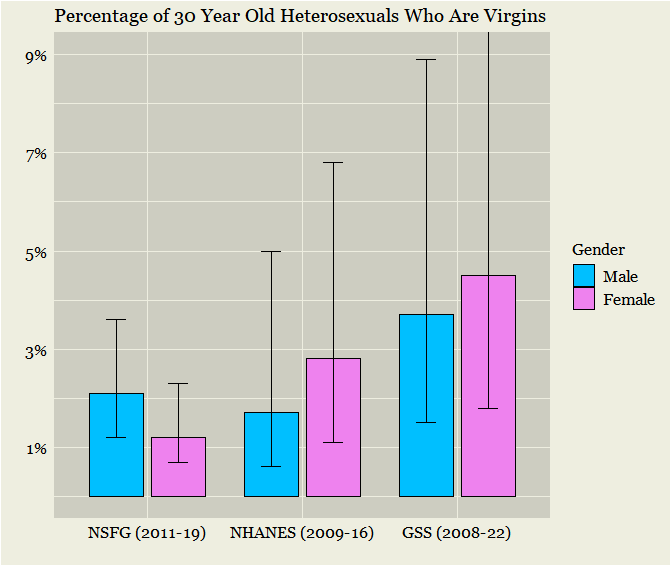
The largest dataset, the NSFG, shows a rate of 2.1% for men and 1.2% for women. NHANES shows a similar rate of 1.7% for men and a slightly higher one for women of 2.8%. The GSS shows the highest rates of 3.7% for men and 4.5% for women, and this is despite the question not specifying vaginal sex like the others. I guess it’s possible that some respondents had sex prior to turning 18 and then decided it wasn’t for them, or maybe some of them misinterpreted the question to mean new sex partners since turning 18 while they had been in a relationship with their high school sweetheart since then, or premarital sex partners. The sample sizes are the lowest at 103 and 128, but the rates are also higher when looking at 30-35s. It’s not because the rates have suddenly shot up in recent years either. This chart shows the rates for 30-35 men:
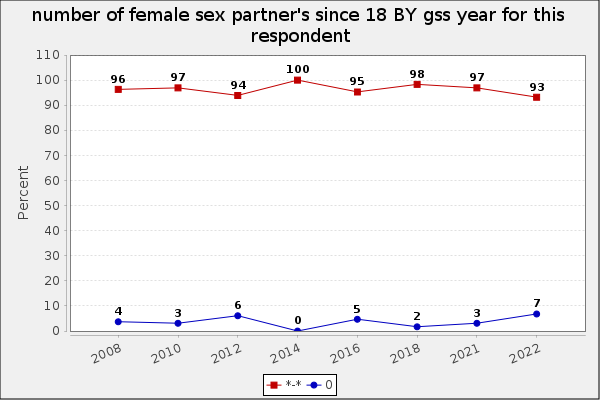
The NSFG also doesn’t show evidence for a rise in the wizard rate from 2011-19:
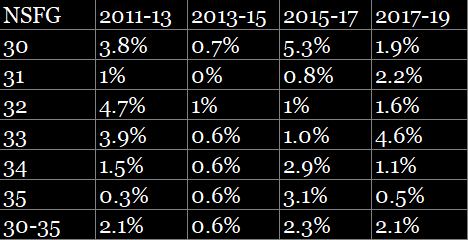
Some have forecasted an ‘explosion of wizards’, but I guess we’ll have to wait to see if the sex decline observed among the young follows them well into adulthood or if ‘delayed adolescence’ will tend to be a more temporary phase. From the data that currently exists for people from their mid to late 20s it doesn’t really seem like there will be one for a while at least.
What Predicts Wizardhood?
What sociodemographic factors are associated with men travelling down this path? I ran a logistic regression analysis on the NSFG data for 30-35s using variables that seemed like they could play a role. Of 3,374 men, 69 remained virgins. We find a negative effect of being Hispanic, a positive effect of being college educated and living at home, and a negative effect of having drank alcohol and binge drank in the past year.
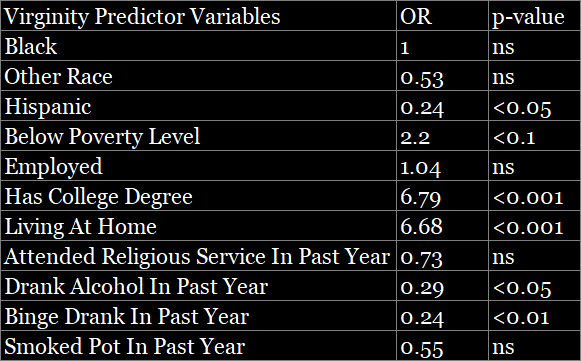
The data for height and weight aren’t publicly available for 2017-19, but here is a separate model including these variables:
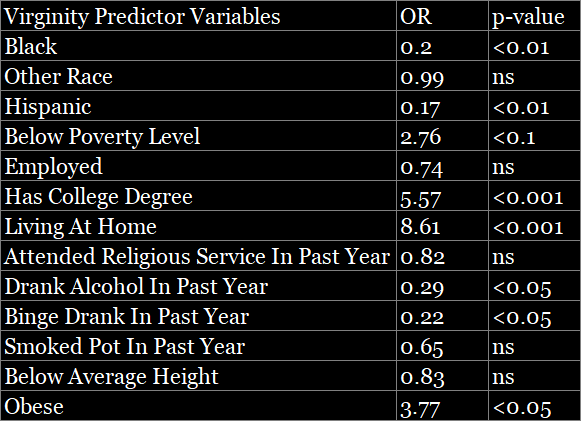
What kind of picture does this paint? More likely to be college educated so probably not lacking cognitively at least. More likely to be living at home so probably has trouble living independently or properly integrating into society. Less likely to consume alcohol which implies less socially active and more risk averse. More fat. One might say that they fit the profile of someone on the spectrum fairly well, which would make sense considering autism is a strong predictor of chronic virginity. In a study by Schöttle et al. (2017), close to half of high-functioning autistic men were virgins while not one neurotypical man reported being one. The mean ages were in the late 30s.
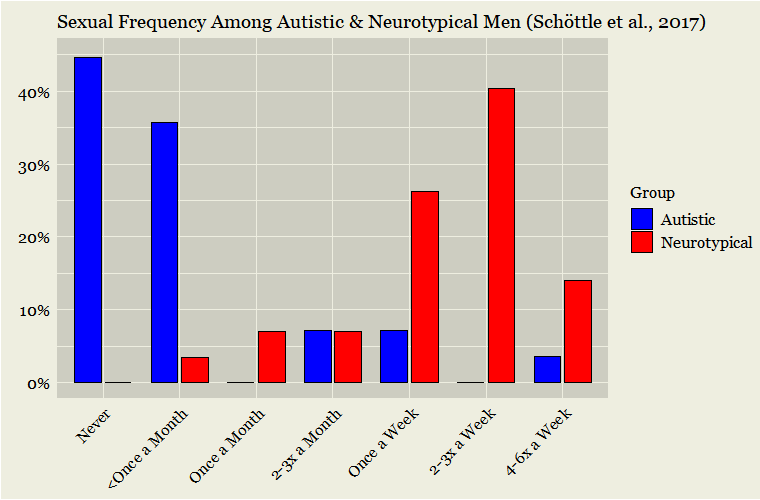
We didn’t see any effect of height here at least (if anything wizards were taller, but of course the effect would need to be large to detect it here), but we saw an effect of obesity. It’s possible that this is because obesity’s effect on attractiveness, but it could also be that they’ve given up on life and let themselves go. These people probably lack much physical activity in their lives which wouldn’t help matters. It’s also arguably another sign of autism as autistic people are more likely to be obese (and also underweight, Sedgewick et al., 2020), or alternatively of low testosterone. It’s possible that facial attractiveness may play a role. Prokop & Fedor (2011) found a small but significant effect of facial attractiveness on the probability of parenthood for men above 40 (but not height).
Who else fits into the 2%? There’s probably some genuine asexuals out there. It’s hard to get exact figures on it, but the most common estimate seems to be about 1%, and in line with the libido gap more women than men seem to experience it, which may account for a good chunk of their 30 year old virgins. While Asperger’s/autism was far and away the most common disability experienced by men on the show ‘The Undateables’, others such as Down syndrome, Crouzon syndrome, and brittle bone disease made an appearance. Some may have severe ED. Some may simply be focusing on their sigma grind. What is clear is that for this to happen involuntarily there has to be something very special about you.
In terms of what they themselves stated the reason to be, in the NSFG data 43.5% said it was against their religion or morals, 2.5% didn’t want to get a female pregnant, 3.5% didn’t want an STD, 40.2% hadn’t found the right person yet, 1.2% were in a relationship waiting for the right time, and 12.3% selected ‘other’. So at least half may be wizards ‘voluntarily’ (volwiz?), although you could of course argue that the inability to find a spouse wasn’t quite as voluntary.
So it seems like men who earn this title are quite significant outliers. If you think about it there are less virgins than there would be if lifelong monogamy were mandated and all people who could pair up did, as some 5% more males than females tend to be born and they’re not dying as much as they used to. Some people may find this hopeful, but for those approaching or already in this cohort they may find it a lot more grim to realize how abnormal they truly are, and how over it may truly be for them as there may be less room to still be a ‘late bloomer’ than they had imagined.
References
Schöttle, D., Briken, P., Tüscher, O., & Turner, D. (2017). Sexuality in autism: hypersexual and paraphilic behavior in women and men with high-functioning autism spectrum disorder. Dialogues in clinical neuroscience, 19(4), 381–393. https://doi.org/10.31887/DCNS.2017.19.4/dschoettle
Sedgewick, F., Leppanen, J., & Tchanturia, K. (2020). Autistic adult outcomes on weight and body mass index: a large-scale online study. Eating and weight disorders : EWD, 25(3), 795–801. https://doi.org/10.1007/s40519-019-00695-8
Prokop, P., & Fedor, P. (2011). Physical attractiveness influences reproductive success of modern men. Journal of Ethology, 29(3), 453–458. https://doi.org/10.1007/s10164-011-0274-0
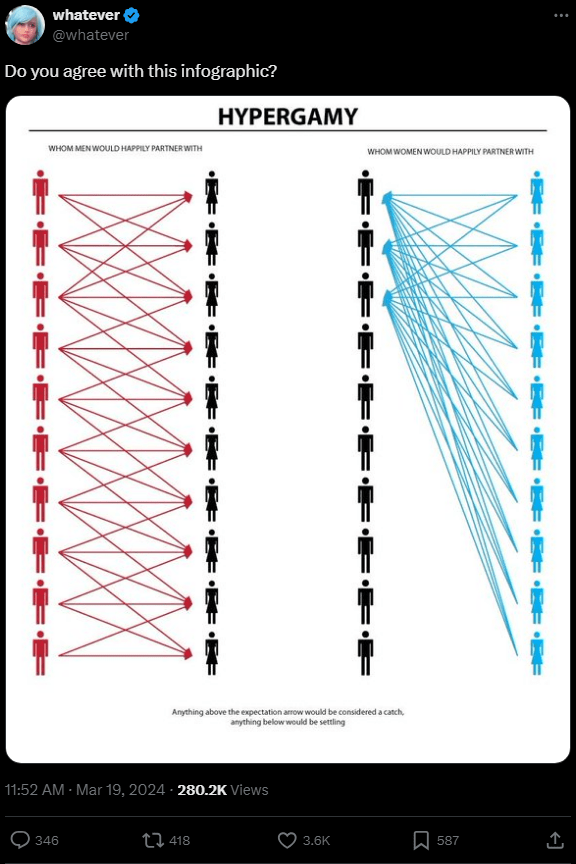

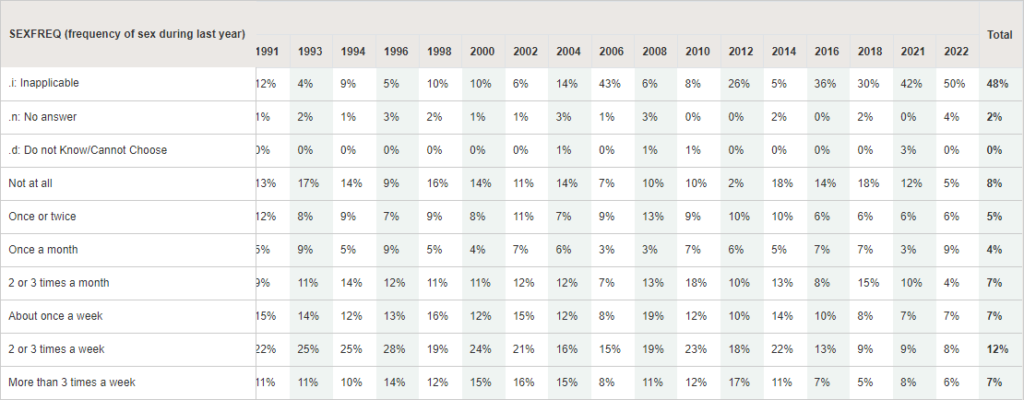
Not autistic, not short, not obese, college educated, not asexual. So i’m an outlier uh, what a grim destiny…
Someone essentially assisted me in composing substantial articles. I would say that this is the very first time I have visited your website, and thus far I am impressed with the research you conducted to produce this outstanding submission. Well done.
Its like you read my mind You appear to know a lot about this like you wrote the book in it or something I think that you could do with some pics to drive the message home a little bit but instead of that this is fantastic blog An excellent read I will certainly be back
I am not sure where youre getting your info but good topic I needs to spend some time learning much more or understanding more Thanks for magnificent info I was looking for this information for my mission
Thank you for the auspicious writeup It in fact was a amusement account it Look advanced to far added agreeable from you However how can we communicate
Thank you for the auspicious writeup It in fact was a amusement account it Look advanced to far added agreeable from you However how can we communicate
I have been browsing online more than three hours today yet I never found any interesting article like yours It is pretty worth enough for me In my view if all website owners and bloggers made good content as you did the internet will be a lot more useful than ever before
very informative articles or reviews at this time.
Awesome! Its genuinely remarkable post, I have got much clear idea regarding from this post
This was beautiful Admin. Thank you for your reflections.
I truly appreciate your technique of writing a blog. I added it to my bookmark site list and will
I’m often to blogging and i really appreciate your content. The article has actually peaks my interest. I’m going to bookmark your web site and maintain checking for brand spanking new information.
Good post! We will be linking to this particularly great post on our site. Keep up the great writing
very informative articles or reviews at this time.
I am truly thankful to the owner of this web site who has shared this fantastic piece of writing at at this place.
Very well presented. Every quote was awesome and thanks for sharing the content. Keep sharing and keep motivating others.
I’m often to blogging and i really appreciate your content. The article has actually peaks my interest. I’m going to bookmark your web site and maintain checking for brand spanking new information.
I do agree with all the ideas you have introduced on your post They are very convincing and will definitely work Still the posts are very short for newbies May just you please prolong them a little from subsequent time Thank you for the post
Your blog is a true gem in the world of online content. I’m continually impressed by the depth of your research and the clarity of your writing. Thank you for sharing your wisdom with us.
I do believe all the ideas youve presented for your post They are really convincing and will certainly work Nonetheless the posts are too short for novices May just you please lengthen them a little from subsequent time Thanks for the post
Nice blog here Also your site loads up very fast What host are you using Can I get your affiliate link to your host I wish my site loaded up as quickly as yours lol
you are in reality a just right webmaster The site loading velocity is incredible It seems that you are doing any unique trick In addition The contents are masterwork you have performed a wonderful task on this topic
I loved as much as you will receive carried out right here The sketch is tasteful your authored subject matter stylish nonetheless you command get got an edginess over that you wish be delivering the following unwell unquestionably come further formerly again as exactly the same nearly very often inside case you shield this hike
Every time I visit your website, I’m greeted with thought-provoking content and impeccable writing. You truly have a gift for articulating complex ideas in a clear and engaging manner.
of course like your website but you have to check the spelling on several of your posts A number of them are rife with spelling issues and I in finding it very troublesome to inform the reality on the other hand I will certainly come back again
The degree to which I appreciate your creations is equal to your own sentiment. Your sketch is tasteful, and the authored material is stylish. Yet, you seem uneasy about the prospect of embarking on something that may cause unease. I agree that you’ll be able to address this matter efficiently.
I was recommended this website by my cousin I am not sure whether this post is written by him as nobody else know such detailed about my difficulty You are wonderful Thanks
Wow amazing blog layout How long have you been blogging for you made blogging look easy The overall look of your web site is magnificent as well as the content
Eu simplesmente não poderia sair do seu site antes de sugerir que realmente gostei das informações padrão que uma pessoa fornece sobre seus visitantes. Voltarei incessantemente para verificar novas postagens
Thanks I have just been looking for information about this subject for a long time and yours is the best Ive discovered till now However what in regards to the bottom line Are you certain in regards to the supply
Olá, acho que vi que você visitou meu site, por isso vim devolver o favor. Estou tentando encontrar coisas para melhorar meu site. Suponho que não há problema em usar algumas de suas ideias
Its like you read my mind You appear to know so much about this like you wrote the book in it or something I think that you can do with a few pics to drive the message home a little bit but instead of that this is excellent blog A fantastic read Ill certainly be back
startup talky I very delighted to find this internet site on bing, just what I was searching for as well saved to fav
сервисный центр iphone в москве
Normally I do not read article on blogs however I would like to say that this writeup very forced me to try and do so Your writing style has been amazed me Thanks quite great post
Techno rozen Pretty! This has been a really wonderful post. Many thanks for providing these details.
Профессиональный сервисный центр по ремонту сотовых телефонов, смартфонов и мобильных устройств.
Мы предлагаем: ближайший сервис по ремонту телефонов
Наши мастера оперативно устранят неисправности вашего устройства в сервисе или с выездом на дом!
Fourweekmba I really like reading through a post that can make men and women think. Also, thank you for allowing me to comment!
I loved as much as you will receive carried out right here The sketch is tasteful your authored subject matter stylish nonetheless you command get got an edginess over that you wish be delivering the following unwell unquestionably come further formerly again as exactly the same nearly very often inside case you shield this hike
Just wish to say your article is as surprising The clearness in your post is just cool and i could assume youre an expert on this subject Fine with your permission allow me to grab your RSS feed to keep updated with forthcoming post Thanks a million and please keep up the enjoyable work
Hello there, You have done a fantastic job. I will definitely digg it and in my view recommend to my friends. I’m confident they will be benefited from this web site.
allegheny county real estate Great information shared.. really enjoyed reading this post thank you author for sharing this post .. appreciated
Thank you for the auspicious writeup It in fact was a amusement account it Look advanced to far added agreeable from you However how can we communicate
Tech to Force I very delighted to find this internet site on bing, just what I was searching for as well saved to fav
Профессиональный сервисный центр по ремонту бытовой техники с выездом на дом.
Мы предлагаем: сервисные центры по ремонту техники в москве
Наши мастера оперативно устранят неисправности вашего устройства в сервисе или с выездом на дом!
What i do not understood is in truth how you are not actually a lot more smartlyliked than you may be now You are very intelligent You realize therefore significantly in the case of this topic produced me individually imagine it from numerous numerous angles Its like men and women dont seem to be fascinated until it is one thing to do with Woman gaga Your own stuffs nice All the time care for it up
My brother suggested I might like this website He was totally right This post actually made my day You cannt imagine just how much time I had spent for this information Thanks
Attractive section of content I just stumbled upon your blog and in accession capital to assert that I get actually enjoyed account your blog posts Anyway I will be subscribing to your augment and even I achievement you access consistently fast
I do believe all the ideas youve presented for your post They are really convincing and will certainly work Nonetheless the posts are too short for novices May just you please lengthen them a little from subsequent time Thanks for the post